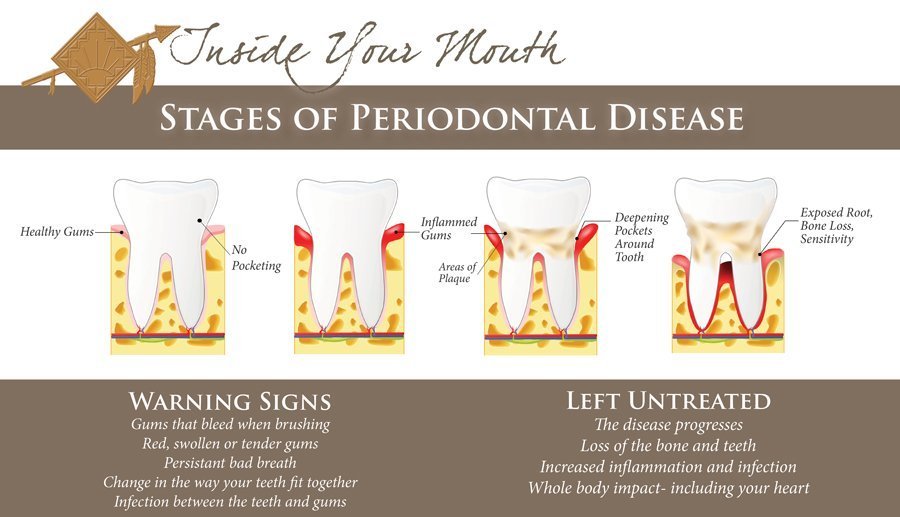Periodontal Maintenance
Periodontal diseases are infections of the gums, which gradually destroy the support of your natural teeth. There are numerous disease entities requiring different treatment approaches. Dental plaque is the primary cause of gum disease in genetically susceptible individuals. Daily brushing and flossing will prevent most periodontal conditions.
Adults over 35 lose more teeth to gum diseases, (periodontal disease) than from cavities. The best way to prevent cavities and periodontal disease is by good tooth brushing and flossing techniques, performed daily.
Periodontal disease is caused by bacterial plaque. Plaque is a colorless film, which sticks to your teeth at the gum line. Plaque constantly forms on your teeth. By thorough daily brushing and flossing you can remove these germs and help prevent periodontal disease.
Other Important Factors Affecting The Health Of Your Gums Include:
- Smoking
- Diabetes
- Stress
- Clenching and grinding teeth
- Medication
- Poor nutrition
Preventing Gum Disease
The best way to prevent gum disease is effective daily brushing and flossing as well as regular professional examinations and cleanings. Unfortunately, even with the most diligent home dental care, people still can develop some form of periodontal disease. Once this disease starts, professional intervention is necessary to prevent its progress.
When you have a procedure called scaling and root planing at Branson Dental Center, the purpose is to remove deposits of calculus, better know as tartar, and plaque on the teeth below the gumline and to smooth the root surfaces that have become infected with bacteria.
Stages Of Periodontal Disease

Here Are Some Simple Directions For Helping To Make You More Comfortable And Will Help To Prevent Any Possible Complications:
- Care of your mouth: Start brushing with a soft toothbrush immediately, followed by dental flossing. Your gums may be sensitive, but make every effort to keep your mouth plaque free. You can rinse your mouth several times on the day of treatment with warm salt water (1/4 tsp. salt to 8 oz. water). A chlorhexidine rinse may be prescribed by your dental professional.
- Discomfort: Some discomfort is expected when the anesthesia wears off. Usually a couple of acetaminophen or ibuprofen tablets will alleviate any discomfort. Sensitivity to cold or touch may also occur temporarily.
- Eating: Your next meal should be soft. Avoid any hard, gritty foods such as peanuts, popcorn, chips and hard bread for the next 3-4 days. Also, it is best to avoid hot and spicy foods and alcohol for 24 hours.
- Bleeding: Slight bleeding may continue for several hours following the procedure. This is not unusual and should stop soon.
- Swelling: Swelling seldom occurs. If it does, rinse your mouth out of every couple hours with warm salt water (if not on a salt restricted diet).
- Smoking: Please refrain from smoking for 24 hours or longer. Tobacco use interferes with healing.
- Exercise: Avoid any aerobic activity for the rest of the day. Take it easy!
The benefits of scaling and root planing are many; however, this procedure alone is not always sufficient to stop periodontal disease. Three month periodontal maintenance procedures are an important part of this therapy.
